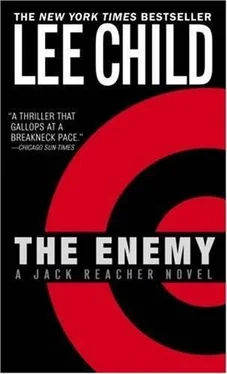“Once or twice,” she said. “Why?”
“When did you last see him?”
“I don’t remember.”
“Not recently?”
“No. Not recently. Why?”
“How did you meet him?”
“Professionally,” she said.
“You teach your stuff to Armored Branch?”
“Irwin isn’t exclusively Armored Branch. It’s the National Training Center too, don’t forget. People used to come to us there. Now we go to them.”
I said nothing.
“Does it surprise you we taught Armored people?”
I shrugged again. “A little, I guess. If I was riding around in a seventy-ton tank, I don’t suppose I’d feel a need for any more of a psychological edge.”
She still didn’t smile. “We taught them. As I recall General Kramer didn’t like it if the infantry was getting things his people weren’t. It was an intense rivalry.”
“Who do you teach now?”
“Delta Force,” she said. “Exclusively.”
“Thank you for your help,” I said.
“I didn’t recognize anything tonight that we would take responsibility for.”
“Not specifically.”
“It was psychologically generic,” she said.
“OK,” I said.
“And I resent being asked.”
“OK,” I said again. “Good night, ma’am.”
I got up out of the chair and headed for the door.
“What was the real reason?” she asked. “If the display we saw was bogus?”
“I don’t know,” I said. “I’m not that smart.”
I stoppedin my outer office and the sergeant with the baby son gave me coffee. Then I went into my inner office and found Summer waiting for me there. She had come to collect her lists, because the Kramer case was closed.
“Did you check the other women?” I asked her. “Apart from Norton?”
She nodded. “They all have alibis. It’s the best night of the year for alibis. Nobody spends New Year’s Eve alone.”
“I did,” I said.
She said nothing back. I butted the papers into a neat stack and put them back inside their folder and unclipped the note off the front. Hope your mom was OK . I dropped the note in my drawer and handed the file to her.
“What did Norton tell you?” she asked.
“She agreed with me that it was homicide dressed up to look like gay-bashing. I asked her if any of the symbols came from Psy-Ops classes and she didn’t really say yes or no. She said they were psychologically generic. She resented being asked.”
“So what now?”
I yawned. I was tired. “We’ll work it like we work any of them. We don’t even know who the victim is yet. I guess we’ll find out tomorrow. On deck at seven, OK?”
“OK,” she said, and headed for my door, carrying her file.
“I called Rock Creek,” I said. “Asked a clerk to find their copy of the order bringing me here from Panama.”
“And?”
“He said it’s got Garber’s signature on it.”
“But?”
“That’s not possible. Garber got me on the phone on New Year’s Eve and was surprised I was here.”
“Why would a clerk lie?”
“I don’t think a clerk would. I think the signature is a forgery.”
“Is that conceivable?”
“It’s the only explanation. Garber couldn’t have forgotten he’d transferred me here forty-eight hours previously.”
“So what’s this all about?”
“I have no idea. Someone somewhere is playing chess. My brother told me I should find out who wants me here bad enough to pull me out of Panama and replace me with an asshole. So I tried to find out. And now I’m thinking maybe we should be asking the same question about Garber. Who wants him out of Rock Creek bad enough to replace him with an asshole?”
“But Korea has to be a genuine merit promotion, doesn’t it?”
“Garber deserves it, no question,” I said. “Except it’s too early. It’s a one-star job. DoD has to bring it to the Senate. That process happens in the fall, not in January. This was a panic move, spur of the moment.”
“But that would be pointless chess,” Summer said. “Why bring you in and pull him out? The two moves neutralize each other.”
“So maybe there are two people playing. Like a tug-of-war. Good guy, bad guy. Win one, lose one.”
“But the bad guy could have won both, easily. He could have discharged you. Or sent you to prison. He’s got the civilian complaint to work with.”
I said nothing.
“It doesn’t add up,” Summer said. “Whoever’s playing on your side is willing to let Garber go but is powerful enough to keep you here, even with the civilian complaint on the table. Powerful enough that Willard knew he couldn’t proceed against you, even though he probably wanted to. You know what that means?”
“Yes,” I said. “I do.”
She looked straight at me.
“It means you’re seen as more important than Garber,” she said. “Garber’s gone, and you’re still here.”
Then she looked away and went quiet.
“Permission to speak freely, Lieutenant,” I said.
She looked back at me.
“You’re not more important than Garber,” she said. “You can’t be.”
I yawned again.
“No argument from me,” I said. “Not on that particular subject. This is not about a choice between me and Garber.”
She paused. Then she nodded.
“No,” she said. “It isn’t. This is about a choice between Fort Bird and Rock Creek. Fort Bird is seen as more important. What’s happening here on the post is seen as more sensitive than what’s happening at special unit headquarters.”
“Agreed,” I said. “But what the hell is happening here?”
I took the first tentative steptoward finding out at one minute past seven the next morning, in Fort Bird’s mortuary. I had slept for three hours and I hadn’t eaten breakfast. There aren’t many hard-and-fast rules involved in military crime investigation. Mostly we depend on instinct and improvisation. But one of the few rules that exist is: You don’t eat before you walk into an army postmortem.
So I spent the breakfast hour with the crime scene report. It was a fairly thick file, but it had no useful information in it. It listed all the recovered uniform items and described them in minute detail. It described the corpse. It listed times and temperatures. All the thousands of words were backed by dozens of Polaroid photographs. But neither the words nor the pictures told me what I needed to know.
I put the file in my desk drawer and called the Provost Marshal’s office for any AWOL or UA reports. The dead guy might have been missed already, and we might have been able to pick up on his identity that way. But there were no reports. Nothing out of the ordinary. The post was humming along with all its ducks in a row.
I walked out into the morning cold.
The mortuary had been custom-built during the Eisenhower administration and it was still fit for its purpose. We weren’t looking for a high degree of sophistication. This wasn’t the civilian world. We knew last night’s victim hadn’t slipped on a banana skin. I didn’t much care which particular injury had been the fatal one. All I wanted to know was an approximate time of death, and who he was.
There was a tiled lobby inside the main doors with exits to the left, the center, and the right. If you went left, you found the offices. If you went right, you found cold storage. I went straight ahead, where knives cut and saws whined and water sluiced.
There were two dished metal tables set in the center of the room. They had bright lights above them and noisy drains below. They were surrounded by greengrocer scales hanging on chains ready to weigh excised organs, and by rolling steel carts with empty glass jars ready to receive them, and other carts with rows of knives and saws and shears and pliers lying ready for use on green canvas sheets. The whole place was glazed with white subway tiles and the air was cold and sweet with the smell of formaldehyde.
Читать дальше












